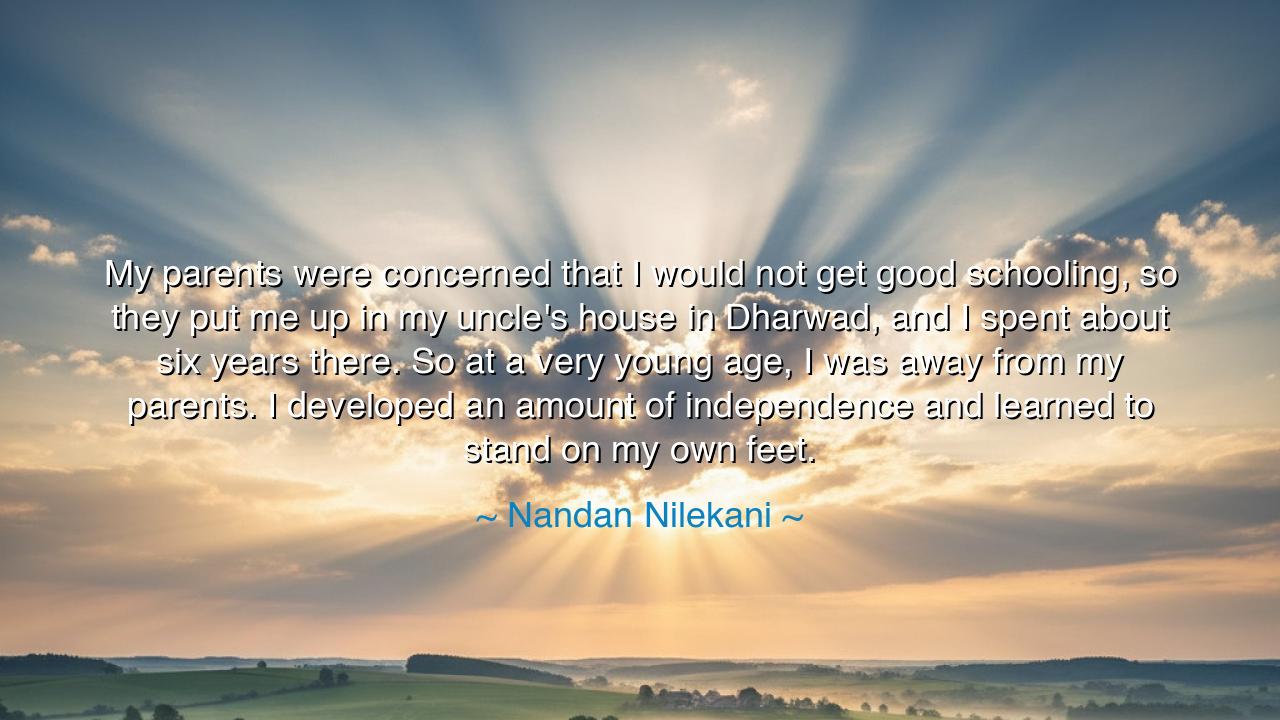
My parents were concerned that I would not get good schooling, so
My parents were concerned that I would not get good schooling, so they put me up in my uncle's house in Dharwad, and I spent about six years there. So at a very young age, I was away from my parents. I developed an amount of independence and learned to stand on my own feet.






"My parents were concerned that I would not get good schooling, so they put me up in my uncle's house in Dharwad, and I spent about six years there. So at a very young age, I was away from my parents. I developed an amount of independence and learned to stand on my own feet." – Nandan Nilekani
Hear now the words of Nandan Nilekani, a builder of modern India, who speaks with humility of the roots from which his strength was formed. In this reflection, he reminds us that independence is not a gift bestowed by others but a virtue forged in solitude and responsibility. His story is not merely one of childhood separation; it is the timeless tale of how distance can become a crucible for growth. To be sent away from the comfort of one’s home at a tender age is a trial — yet it is through such trials that the soul learns endurance, and the spirit discovers its true power.
The meaning of his words lies in the understanding that independence begins not in grand achievements, but in the small acts of standing alone — in the quiet victories of self-reliance. Nilekani’s experience in Dharwad, far from his parents’ watchful eyes, was his first encounter with the world as it is: demanding, uncertain, and full of unseen lessons. There, he learned to care for himself, to make choices without guidance, to endure loneliness without losing hope. Such early independence, though born of necessity, becomes the foundation upon which later greatness is built. For no one can lead others who has not first learned to lead himself.
The origin of this reflection is deeply personal, yet universal. Nilekani’s journey from a boy in a small town to a visionary leader and co-founder of Infosys — one of India’s most influential technology companies — began with those years of quiet separation. In Dharwad, he learned what no classroom could teach: how to adapt, how to persevere, how to remain steadfast in the face of challenge. His parents’ decision, born of concern for his education, gave him far more than knowledge — it gave him resilience. And resilience, he would later prove, is the truest education of all.
In the long history of humankind, we find many who walked a similar path. Gautama Buddha, too, left the comfort of his palace, abandoning familiarity to find wisdom. Mahatma Gandhi, as a young man in England and later in South Africa, found his soul shaped by distance and struggle. In each of these journeys, as in Nilekani’s, separation from comfort was not loss but awakening. It is when one stands apart that one learns the measure of one’s own strength. Thus, Nilekani’s story is not of a boy merely surviving on his own, but of a soul learning the sacred discipline of self-reliance.
There is also within his words an echo of gratitude — for though the path was lonely, it was not loveless. His parents’ choice was not abandonment, but an act of faith. They trusted that their son could endure, and in that trust, they gave him the most profound gift a parent can bestow: belief in his potential. Many parents seek to shield their children from hardship, yet Nilekani’s story teaches that hardship, embraced with courage, becomes the forge of destiny. To grow is to struggle; to struggle is to awaken.
From this reflection arises a lesson for all generations. Do not fear solitude, nor shrink from responsibility. The road to independence is often paved with moments of uncertainty and longing, yet each of these moments strengthens the soul. Parents, too, must learn that love does not always mean protection — sometimes it means releasing, letting the young find their own way. For only by learning to stand on one’s own feet can one truly walk the path of purpose.
So let Nilekani’s words be remembered as a testament to the quiet power of self-reliance. In a world that seeks ease, he reminds us that independence is born not from comfort, but from courage. When life separates you from the familiar, take heart — for you are being trained by destiny to rise higher. As the boy from Dharwad grew into a leader who helped shape the digital future of a nation, so too can every individual transform adversity into strength. For in learning to stand alone, we prepare ourselves to stand tall before the world.






AAdministratorAdministrator
Welcome, honored guests. Please leave a comment, we will respond soon